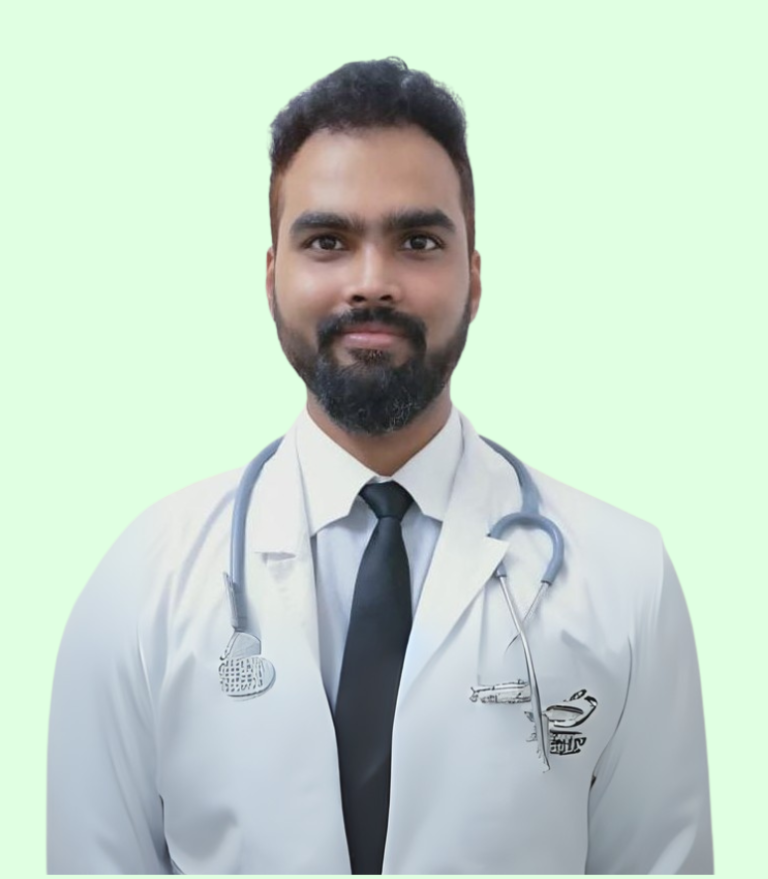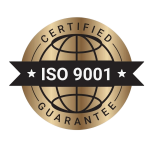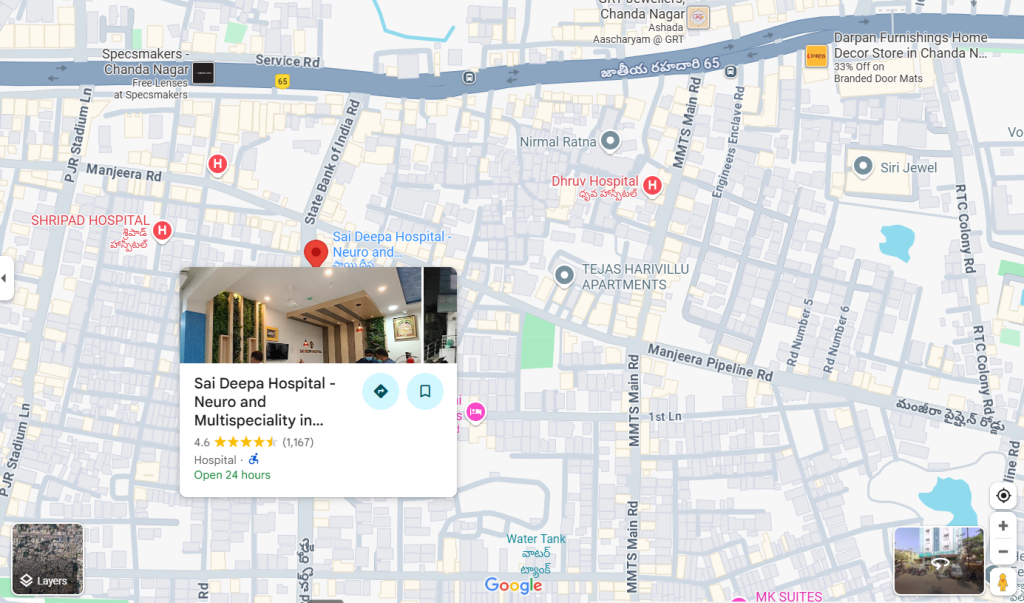Best Varicose Veins Treatment in Hyderabad
- Home
- Best Varicose Veins Treatment in Hyderabad
Best Varicose Veins Treatment in Hyderabad
Varicose veins are more than just a cosmetic concern they can lead to significant discomfort and even serious complications if left untreated. These twisted, enlarged veins commonly appear on the legs and feet, affecting both men and women. At Sree Sai Deepa Hospitals, Hyderabad, we specialize in advanced treatments for varicose veins, offering personalized care and minimally invasive solutions for faster recovery and long-term relief.
Book Free Appointment
1L+
Happy Customers
25+
Qualified Doctors
50
Rooms
5000+
Successful Surgeries
Free
Consultation
24/7 Ambulance
Facility
Insurance
Claim Support
What Are Varicose Veins?
Varicose veins are enlarged, swollen, and twisted veins that often appear blue or dark purple. They typically develop in the legs due to increased pressure on the veins while standing or walking.
Faulty or weakened vein valves cause blood to pool in the veins instead of flowing back to the heart, leading to bulging and visible varicosities.

Dr. Sasidhara Roa A
MBBS, MS
5000+ Successful Surgeries
11+ Years of experience
Dr. Sasidhara Rao A. is an experienced General and Laparoscopic Surgeon at Sree Sai Deepa Hospitals, Chandanagar, with over 11 years of expertise and 5000+ successful surgeries. He specializes in laparoscopic, laser, and microscopic surgeries, treating conditions like piles, fissures, varicose veins, and gallbladder issues.
Doctor’s Fellowships:
Fellowship - International Society of Coloproctology
Fellowship in Intimate Health
Fellowship in Diagnostic Endoscopy
What Are the Symptoms of Varicose Veins?
Varicose veins can cause a range of symptoms, including:
- Visible, bulging veins on the legs or feet
- Aching or heavy sensation in the legs
- Swelling in ankles and feet
- Burning, throbbing, or cramping in the legs
- Itching around the affected veins
- Skin discoloration or ulceration in severe cases
These symptoms often worsen after prolonged standing or sitting and may improve with leg elevation.
What Are the Causes of Varicose Veins?
Several factors contribute to the development of varicose veins:
- Aging: Valves weaken over time, making older adults more susceptible.
- Genetics: Family history increases the risk.
- Pregnancy: Increased blood volume and hormonal changes put extra pressure on veins.
- Obesity: Excess weight strains the leg veins.
- Sedentary lifestyle: Long periods of sitting or standing hinder proper blood flow.
- Hormonal changes: Especially in women due to menstruation, menopause, or contraceptive use.
How Are Varicose Veins Diagnosed?
Doctors diagnose varicose veins through:
- Physical examination: Identifying visible vein patterns and swelling.
- Duplex ultrasound: A non-invasive scan using sound waves to assess vein structure and blood flow.
- Doppler test: Measures blood flow direction and pressure in the veins.
Accurate diagnosis helps determine the severity and best course of treatment.
Get your surgery cost
What Are the Treatments for Varicose Veins?
Treatment options depend on severity and patient needs. These include:
1. Conservative Management
- Compression stockings: Improve blood flow and relieve symptoms.
- Lifestyle changes: Weight management, leg elevation, and regular exercise.
- Medications: Anti-inflammatory drugs and pain relievers.
2. Minimally Invasive Procedures
- Sclerotherapy: A solution is injected into small veins to collapse them.
- Laser therapy: Laser light targets and seals off tiny varicose veins.
- Radiofrequency ablation (RFA): Heat is used to close larger veins.
These procedures offer quick recovery with minimal discomfort.
What Are the Surgical Options for Varicose Veins?
In severe cases, surgery may be required:
- Vein stripping: Removal of a long vein through small incisions.
- Ambulatory phlebectomy: Tiny skin punctures used to remove surface veins.
- Endovenous laser treatment (EVLT): A laser fiber is inserted into the vein to close it.
Modern surgical techniques are minimally invasive and typically allow patients to return to normal activities within a few days.
Accreditations

Saideepaneurocare Hospitals is NABH certified, a mark of excellence in patient safety and care. We follow stringent healthcare protocols and maintain world-class hygiene standards.

We are ISO 9001 certified, ensuring the highest standards in quality management and patient care. This certification reflects our commitment to efficient processes and continuous improvement in healthcare services.
What Are the Side Effects of Varicose Veins?
If left untreated, varicose veins can lead to complications:
- Chronic pain and swelling
- Skin ulcers or sores
- Blood clots (superficial thrombophlebitis or deep vein thrombosis)
- Bleeding from ruptured veins
- Skin hardening or darkening
Early intervention can prevent these outcomes and improve your quality of life.
Do Varicose Veins Return After Treatment?
Varicose veins may recur if the underlying causes persist. New varicosities can develop even after successful treatment. Regular follow-ups, lifestyle changes, and preventive care reduce the likelihood of recurrence.
Sai Deepa Hospital - Neuro and Multispeciality
Plot no 387, Church road, Huda colony, Chanda Nagar, Hyderabad – 500050
Can Varicose Veins Be Prevented?
While not always preventable, you can reduce your risk by:
- Exercising regularly to boost circulation
- Maintaining a healthy weight
- Elevating legs while resting
- Avoiding prolonged standing or sitting
- Wearing compression stockings when advised
Which is the Best Hospital for Varicose Veins in Hyderabad
At Sree Sai Deepa Hospitals, we prioritize precision care, patient comfort, and lasting results. Our vascular specialists use cutting-edge technology and minimally invasive techniques to treat varicose veins effectively. From diagnosis to recovery, our dedicated team offers comprehensive support tailored to your health needs.
We believe that no one should suffer from the discomfort and risks associated with varicose veins. With experienced specialists, advanced equipment, and personalized care, we have earned the trust of patients across Chandanagar, Miyapur, and Kukatpally.
Where to get the best Varicose Veins treatment in Chandanagar, Hyderabad?
📍 Sai Deepa Hospitals, Chanda Nagar, Hyderabad
📞 Call or WhatsApp: +91-7093762716
🌐 www.saideepaneurocare.com
Best Varicose Veins surgeon in Chandanagar | Best Varicose Veins surgeon in Miyapur | Best Varicose Veins surgeon in Kukatpally | Best Varicose Veins surgeon in Hyderabad
FAQ's on Varicose Veins
1. What are the main causes of varicose veins?
Varicose veins are mainly caused by weakened vein valves, age, genetics, hormonal shifts, and inactivity.
2. How to reduce varicose veins on legs?
You can reduce them by wearing compression stockings, exercising, and maintaining a healthy weight.
3. What is the best home remedy for varicose veins?
Home remedies include leg elevation, cold compresses, and natural anti-inflammatory foods like ginger and garlic.
4. What is the best treatment for varicose veins?
Minimally invasive options like laser therapy and radiofrequency ablation offer the best outcomes with minimal recovery time.
5. What is the best exercise for varicose veins?
Walking, cycling, and swimming improve circulation and reduce pressure in the leg veins.
6. What deficiency causes varicose veins?
Vitamin C, vitamin E, and bioflavonoid deficiencies may weaken vein walls and contribute to vein issues.


